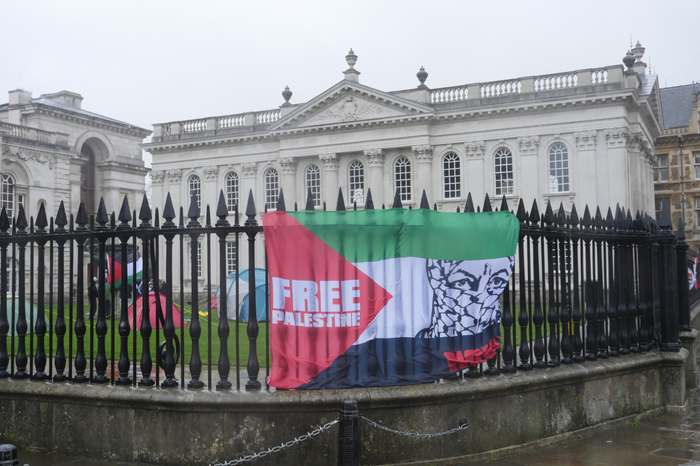Cambridge uses Prevent to ‘restrict’ pro-Palestine protest, say students
The University’s Amnesty society have claimed the scheme leads to ‘violations’ of free speech

Student campaigners have claimed that the counter-terrorist Prevent scheme is used to “restrict” pro-Palestine protest in Cambridge.
The University’s Amnesty International society tabled a motion at this week’s Students’ Union (SU) student council meeting to voice concerns that the scheme leads to “violations” of free speech and the right to protest.
Prevent is a national counter-terrorism program which legally requires public bodies, including schools and universities, to report people who may turn to extremist activity.
The motion claims that the scheme “prevents freedom of assembly, acts as a tool of student surveillance, and unfairly targets Muslim demographics”.
The group argued that “in recent times, Prevent has restricted student activism, especially pro-Palestine activity”.
They added: “At the University of Cambridge, this has included aggressive responses from colleges, the cancellation of events, and the policing of events”.
The Amnesty society claims that the Prevent program as whole “violates some of our most fundamental human rights and espouses racist, Islamophobic and disablist rhetoric”.
The campaigners, speaking at the SU meeting, claimed that colleges have used the scheme to cancel and police student events. They also said that Prevent enables colleges to be “aggressive” towards political societies.
The proposers of the motion quoted an Amnesty International report which claims that people “have been referred to Prevent for expressing non-violent beliefs”.
“Such referrals interfere with rights to freedom of expression and thought,” the report states.
The student council motion was tabled by the SU’s BME officer, Maroof Rafique. He told Varsity that the campaign plans to educate students on the “implications” of the scheme.
Rafique said: “The Prevent strategy has been widely criticized for its discriminatory impact, particularly on Muslim communities, and for stifling free expression.”
Regarding pro-Palestine protests, he added: “There have been instances where expressions of solidarity have led to Prevent referrals, raising concerns about the policy’s impact on legitimate political activism and freedom of speech, freedom of expression and freedom of assembly.”
“The Cambridge SU BME Campaign has expressed solidarity with Palestinian protests and has called on the University to divest from arms companies,” he said.
The Amnesty report also claims that the scheme led to “interventions in public events, often stifling discussions on topics like Islamophobia and Palestine.”
The report, published in July, is titled: “This is the thought police: the Prevent duty and its chilling effects on human rights.”
Amnesty claims that Prevent results in “students and staff self-censoring” on campus, citing a report by the government’s Joint Committee on Human Rights (JCHR) which claims that “fear and confusion” over the remit of Prevent “was a factor limiting free speech on campus”.
The report also includes a case study about Cambridge, describing a Palestine Society event on the Boycott, Divestment and Sanctions (BDS) movement in 2017. Dr Ruba Salih was removed as the event’s chair by the University’s Prevent Referral Group.
But, according to the report, the University later apologised to Dr Salih, saying that their decision “evoked strong and understandable concerns within our own community and beyond relating to academic freedom”.
Cambridge SU already opposes Prevent, according to a policy titled “students not suspects”. This resolution claims that the scheme “has been used to create an expansive surveillance architecture to spy on the public and to police dissent”.
“The implementation of the Prevent Duty not only isolates Muslim students but undermines the civil liberties of other groups such as environmental, political and humanitarian activists,” the SU policy says.
Last month, the daughter of murdered MP David Amess claimed that the Prevent scheme is not “fit for purpose”.
Amnesty Society’s comments came following months of pro-Palestine protest at Cambridge. On Wednesday, student group Cambridge for Palestine (C4P) re-occupied Senate House lawn, calling for student involvement in an ongoing review of arms investments.
A spokesperson for the University of Cambridge said: “The University firmly supports its students’ rights to freedom of speech and protest, all within the law. The University places great importance on balancing its legal obligations under the Prevent duty with its commitment to protecting freedom of speech and academic freedom.”
The Home Office was contacted for comment.
 Comment / Cambridge’s tourism risks commodifying students18 April 2025
Comment / Cambridge’s tourism risks commodifying students18 April 2025 News / Cambridge student numbers fall amid nationwide decline14 April 2025
News / Cambridge student numbers fall amid nationwide decline14 April 2025 News / Greenwich House occupiers miss deadline to respond to University legal action15 April 2025
News / Greenwich House occupiers miss deadline to respond to University legal action15 April 2025 Comment / The Cambridge workload prioritises quantity over quality 16 April 2025
Comment / The Cambridge workload prioritises quantity over quality 16 April 2025 News / Varsity ChatGPT survey17 April 2025
News / Varsity ChatGPT survey17 April 2025





